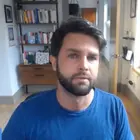Over the past few days, a software package called Deep-Live-Cam has been going viral on social media because it can take the face of a person extracted from a single photo and apply it to a live webcam video source while following pose, lighting, and expressions performed by the person on the webcam. While the results aren't perfect, the software shows how quickly the tech is developing—and how the capability to deceive others remotely is getting dramatically easier over time.
The Deep-Live-Cam software project has been in the works since late last year, but example videos that show a person imitating Elon Musk and Republican Vice Presidential candidate J.D. Vance (among others) in real time have been making the rounds online. The avalanche of attention briefly made the open source project leap to No. 1 on GitHub's trending repositories list (it's currently at No. 4 as of this writing), where it is available for download for free.
"Weird how all the major innovations coming out of tech lately are under the Fraud skill tree," wrote illustrator Corey Brickley in an X thread reacting to an example video of Deep-Live-Cam in action. In another post, he wrote, "Nice remember to establish code words with your parents everyone," referring to the potential for similar tools to be used for remote deception—and the concept of using a safe word, shared among friends and family, to establish your true identity.
Face-swapping technology is not new. The term "deepfake" itself originated in 2017 from a Reddit user called "deepfakes" (combining the terms "deep learning" and "fakes"), who posted pornography that swapped a performer's face with the face of a celebrity. At that time, the technology was expensive and slow and did not operate in real time. However, due to projects like Deep-Live-Cam, it's getting easier for anyone to use this technology at home with a regular PC and free software.
Comments
(・_・;)
There's nothing here…
 New AI tool enables real-time face swapping on webcams, raising fraud concerns
New AI tool enables real-time face swapping on webcams, raising fraud concerns